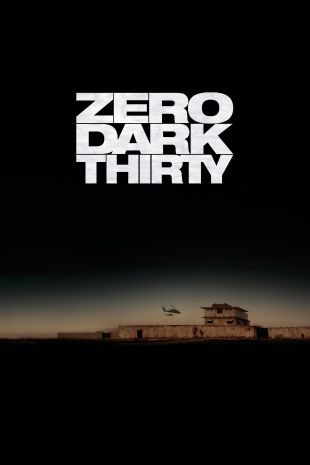Nearly a decade after the Twin Towers were destroyed by a terrorist plot, Kathryn Bigelow's Zero Dark Thirty attempts to directly address how the country as a whole responded to that horrific event. That kind of ambition should be applauded, even if the movie as a whole never quite clears the very high bar it sets for itself.
At the center of this procedural about the hunt for Osama bin Laden is Maya (Jessica Chastain), an intelligence expert whom another character describes early on as "a killer." The picture opens with her at a secret enhanced-interrogation center, where she watches as Dan (Jason Clarke), a master at exerting physical and psychological pressure on captives, applies his skills to a detainee who might have the name of a courier with access to bin Laden.

The graphic depictions of accepted U.S. interrogation techniques -- what many would define as torture -- during this extended sequence force audiences to consider what was arguably the ugliest part of American policy during the presidency of George W. Bush. Make no mistake, the movie certainly takes a stand on the repercussions of this issue through the character of Dan, who is the only person we meet with any second thoughts about what he's doing. His one-sided conversation with some test monkeys is one of the most humane things in the film and offers a prime example of Zero Dark Thirty at its best.
However, that turns out to be just a small fragment of what the picture aims to do. Instead, the main focus is on Maya as she slowly gathers clues and butts heads with higher-ups who, for political or personal reasons, don't want to let this driven woman accomplish her goal. When she finally feels she has a solid lead on bin Laden's actual whereabouts, she convinces the military to strike with an elite force.
That raid makes up the last 30 minutes of the movie and it's a technical marvel, as are the other infrequent action sequences sprinkled throughout the long, talk-filled passages. They confirm that Bigelow remains one of the finest action directors working today, but the finale also clearly reveals the film's biggest flaw, namely screenwriter Mark Boal's inability to make any of the characters three-dimensional. We see appealing actors such as Joel Edgerton and Chris Pratt playing members of the squadron who get the job done, but the script doesn't give any of them a real identity, so we aren't invested in their survival. The lack of a personal connection to the troops is missed all the more because we already know the mission will be a success.
That propensity for flat, two-dimensional characters -- even when they're played by inherently likable actors -- keeps us at a distance. The most obvious example of this is right at the center of it all. Maya doesn't exist outside of her unyielding goal of finding and stopping bin Laden. She has no personal life, and until the final shot of the movie, we're unsure if she has much of an inner life, either. That decision keeps the film from exploring the larger question it raises: Maya -- a fictional composite of different analysts and field agents -- is supposed to represent the country as a whole, but she's too narrow a character for that purpose. She's meant to be a blank slate on whom we can project our own fears, frustrations, and need for vengeance, but she's so focused on her one and only goal that it's difficult to connect with her, no matter how forceful Chastain is in the part.
Bigelow's previous movie The Hurt Locker was revered because it was an expert example of building character through action. We understood the limits and talents of the main character because of what he did. Zero Dark Thirty is more about talk and making explicit points about how changes in the U.S. government and tactics had more to do with the killing of bin Laden than techniques used earlier in the War on Terror. We know Jeremy Renner's character inside and out at the end of The Hurt Locker, but in this movie we aren't left with a better understanding of Maya as a person or the country as a whole.
